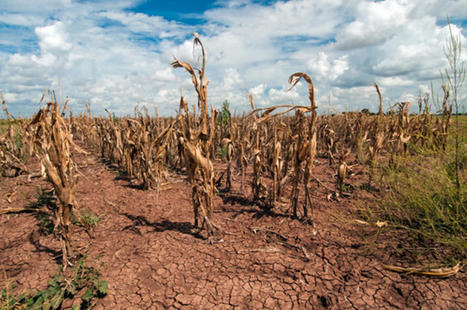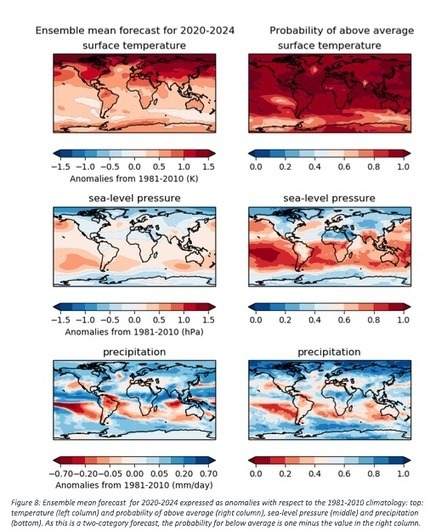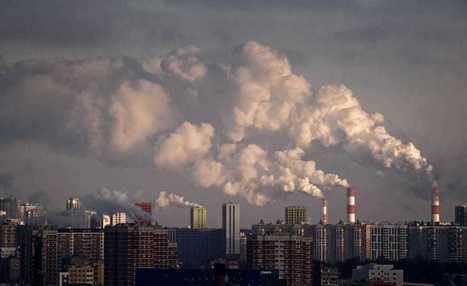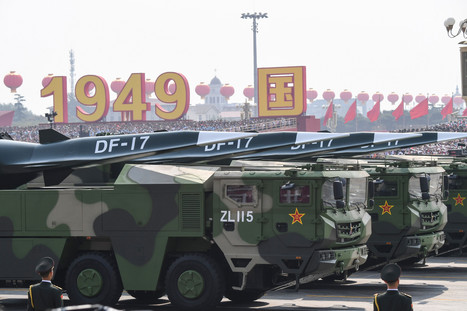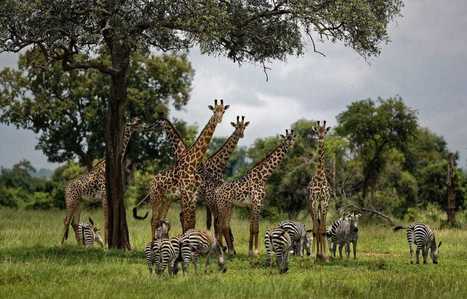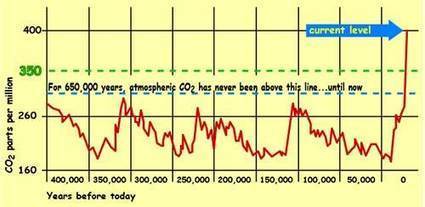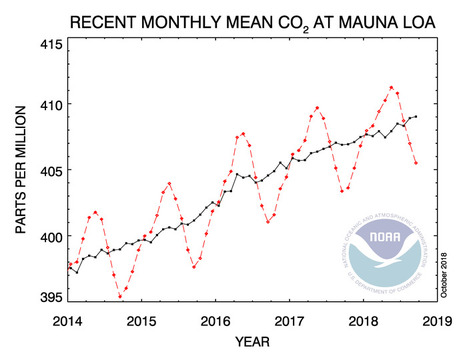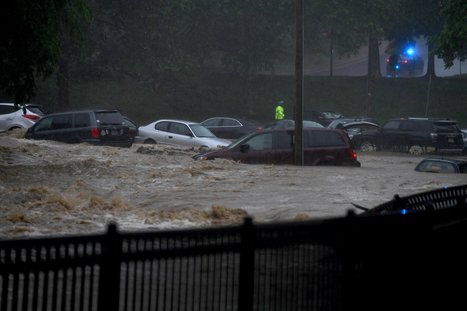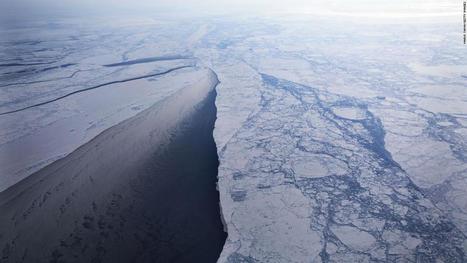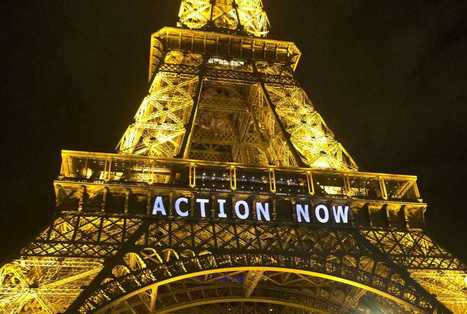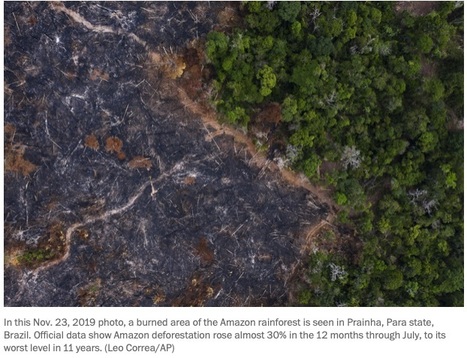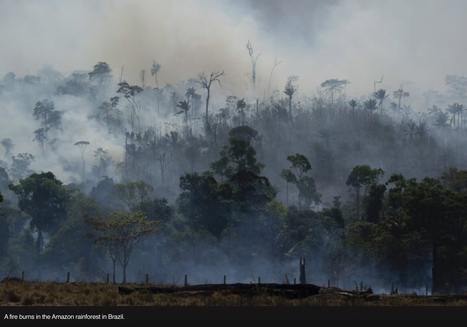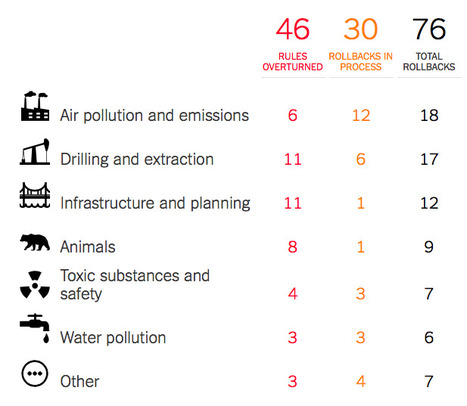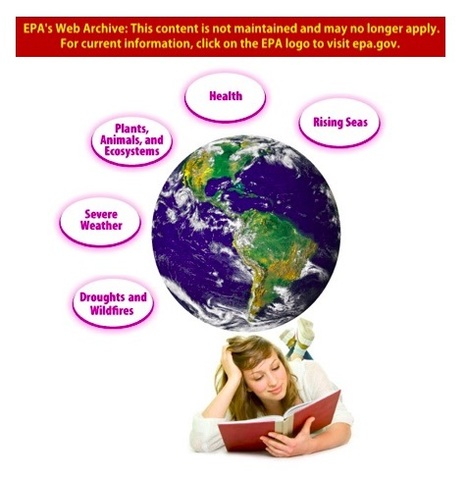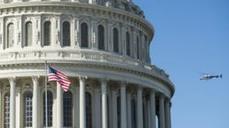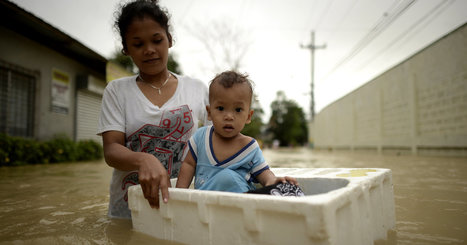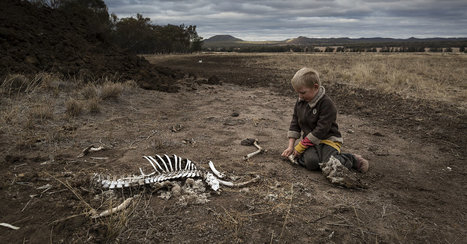 Your new post is loading...
 Your new post is loading...
We report three major and confronting environmental issues that have received little attention and require urgent action. First, we review the evidence that future environmental conditions will be far more dangerous than currently believed. The scale of the threats to the biosphere and all its lifeforms—including humanity—is in fact so great that it is difficult to grasp for even well-informed experts. Second, we ask what political or economic system, or leadership, is prepared to handle the predicted disasters, or even capable of such action. Third, this dire situation places an extraordinary responsibility on scientists to speak out candidly and accurately when engaging with government, business, and the public. We especially draw attention to the lack of appreciation of the enormous challenges to creating a sustainable future. The added stresses to human health, wealth, and well-being will perversely diminish our political capacity to mitigate the erosion of ecosystem services on which society depends. The science underlying these issues is strong, but awareness is weak. Without fully appreciating and broadcasting the scale of the problems and the enormity of the solutions required, society will fail to achieve even modest sustainability goals.
"Geneva, 9 July 2020 – The annual mean global temperature is likely to be at least 1° Celsius above pre-industrial levels (1850-1900) in each of the coming five years (2020-2024) and there is a 20% chance that it will exceed 1.5°C in at least one year, according to new climate predictions issued by the World Meteorological Organization (WMO).
The Global Annual to Decadal Climate Update, led by the United Kingdom’s Met Office, provides a climate outlook for the next five years, updated annually. It harnesses the expertise of internationally acclaimed climate scientists and the best computer models from leading climate centres around the world to produce actionable information for decision-makers.
The earth’s average temperature is already over 1.0 C above the pre-industrial period. The last five-year period has been the warmest five years on record.
'This study shows – with a high level of scientific skill – the enormous challenge ahead in meeting the Paris Agreement on Climate Change target of keeping a global temperature rise this century well below 2 degrees Celsius above pre-industrial levels and to pursue efforts to limit the temperature increase even further to 1.5 degrees Celsius,' said WMO Secretary-General Petteri Taalas.
The predictions take into account natural variations as well as human influences on climate to provide the best possible forecasts of temperature, rainfall, wind patterns and other variables for the coming five years. The forecast models do not take into consideration changes in emissions of greenhouse gases and aerosols as a result of the coronavirus lockdown.
'WMO has repeatedly stressed that the industrial and economic slowdown from COVID-19 is not a substitute for sustained and coordinated climate action. Due to the very long lifetime of CO2 in the atmosphere, the impact of the drop in emissions this year is not expected to lead to a reduction of CO2 atmospheric concentrations which are driving global temperature increases,' said Professor Taalas.
'Whilst COVID-19 has caused a severe international health and economic crisis, failure to tackle climate change may threaten human well-being, ecosystems and economies for centuries, Governments should use the opportunity to embrace climate action as part of recovery programmes and ensure that we grow back better,' he said."
"To: Leaders and citizens of the world
Re: Closer than ever: It is 100 seconds to midnight
Date: January 23, 2020
Humanity continues to face two simultaneous existential dangers—nuclear war and climate change—that are compounded by a threat multiplier, cyber-enabled information warfare, that undercuts society’s ability to respond. The international security situation is dire, not just because these threats exist, but because world leaders have allowed the international political infrastructure for managing them to erode.
In the nuclear realm, national leaders have ended or undermined several major arms control treaties and negotiations during the last year, creating an environment conducive to a renewed nuclear arms race, to the proliferation of nuclear weapons, and to lowered barriers to nuclear war. Political conflicts regarding nuclear programs in Iran and North Korea remain unresolved and are, if anything, worsening. US-Russia cooperation on arms control and disarmament is all but nonexistent.
Public awareness of the climate crisis grew over the course of 2019, largely because of mass protests by young people around the world. Just the same, governmental action on climate change still falls far short of meeting the challenge at hand. At UN climate meetings last year, national delegates made fine speeches but put forward few concrete plans to further limit the carbon dioxide emissions that are disrupting Earth’s climate. This limited political response came during a year when the effects of manmade climate change were manifested by one of the warmest years on record, extensive wildfires, and quicker-than-expected melting of glacial ice.
Continued corruption of the information ecosphere on which democracy and public decision making depend has heightened the nuclear and climate threats. In the last year, many governments used cyber-enabled disinformation campaigns to sow distrust in institutions and among nations, undermining domestic and international efforts to foster peace and protect the planet.
This situation—two major threats to human civilization, amplified by sophisticated, technology-propelled propaganda—would be serious enough if leaders around the world were focused on managing the danger and reducing the risk of catastrophe. Instead, over the last two years, we have seen influential leaders denigrate and discard the most effective methods for addressing complex threats—international agreements with strong verification regimes—in favor of their own narrow interests and domestic political gain. By undermining cooperative, science- and law-based approaches to managing the most urgent threats to humanity, these leaders have helped to create a situation that will, if unaddressed, lead to catastrophe, sooner rather than later.
Faced with this daunting threat landscape and a new willingness of political leaders to reject the negotiations and institutions that can protect civilization over the long term, the Bulletin of the Atomic Scientists Science and Security Board today moves the Doomsday Clock 20 seconds closer to midnight—closer to apocalypse than ever. In so doing, board members are explicitly warning leaders and citizens around the world that the international security situation is now more dangerous than it has ever been, even at the height of the Cold War.
Civilization-ending nuclear war—whether started by design, blunder, or simple miscommunication—is a genuine possibility. Climate change that could devastate the planet is undeniably happening. And for a variety of reasons that include a corrupted and manipulated media environment, democratic governments and other institutions that should be working to address these threats have failed to rise to the challenge.
The Bulletin believes that human beings can manage the dangers posed by the technology that humans create. Indeed, in the 1990s leaders in the United States and the Soviet Union took bold actions that made nuclear war markedly less likely—and as a result the Bulletin moved the minute hand of the Doomsday Clock the farthest it has been from midnight.
But given the inaction—and in too many cases counterproductive actions—of international leaders, the members of the Science and Security Board are compelled to declare a state of emergency that requires the immediate, focused, and unrelenting attention of the entire world. It is 100 seconds to midnight. The Clock continues to tick. Immediate action is required."
“‘Had serious climate action begun in 2010, the cuts required per year to meet the projected emissions levels for 2°C and 1.5°C would only have been 0.7 per cent and 3.3 per cent per year on average,’ the authors found. ‘However, since this did not happen, the required cuts in emissions are now 2.7 per cent per year from 2020 for the 2°C goal and 7.6 per cent per year on average for the 1.5°C goal.’
Meeting either target would require much more effort than countries pledged at the 2015 Paris climate conference. If nations met their Paris commitments — hardly a given as major emitters such as Australia, Brazil, Japan and the United States fall behind — that would give the world a 66 percent chance of limiting warming to 3 degrees Celsius by 2100.
Such an outcome would be better than uncontrolled warming. But it would not be pleasant. Even at 2 degrees, coral reefs would disappear, rising seas would threaten millions, mosquito-borne diseases would proliferate, droughts and deluges would stress people and landscapes, and tropical fisheries would empty. The risk of triggering feedback loops — for example, thawing permafrost resulting in the release of massive amounts of currently trapped greenhouse gases — would escalate. No one should want their children or grandchildren to live in that world.”
"The world has squandered so much time mustering the action necessary to combat climate change that rapid, unprecedented cuts in greenhouse gas emissions offer the only hope of averting an ever-intensifying cascade of consequences, according to new findings from the United Nations." --------------- "Amid that growing pressure to act, Tuesday’s U.N. report offers a grim assessment of how off-track the world remains. Global temperatures are on pace to rise as much as 3.9 degrees Celsius (7 degrees Fahrenheit) by the end of the century, according to the United Nations’ annual “emissions gap” report, which assesses the difference between the world’s current path and the changes needed to meet the goals of the 2015 Paris climate accord." ——————— "Should that pace continue, scientists say, the result could be widespread, catastrophic effects: Coral reefs, already dying in some places, would probably dissolve in increasingly acidic oceans. Some coastal cities, already wrestling with flooding, would be constantly inundated by rising seas. In much of the world, severe heat, already intense, could become unbearable. Global greenhouse gas emissions must begin falling by 7.6 percent each year beginning 2020 — a rate currently nowhere in sight — to meet the most ambitious aims of the Paris climate accord, the report issued early Tuesday found. Its authors acknowledged that the findings are “bleak.” After all, the world has never demonstrated the ability to cut greenhouse gas emissions on such a scale."
——————— “'Every year of delay beyond 2020 brings a need for faster cuts, which become increasingly expensive, unlikely and impractical,” the report states. “Delays will also quickly put the 1.5C goal out of reach.'”
——————— "On Monday, the intergovernmental World Meteorological Organization reported that levels of greenhouse gases in the atmosphere had hit a record high and that the trend “means that future generations will be confronted with increasingly severe impacts of climate change."
——————— "Niklas Höhne, a German climatologist and founding partner of NewClimate Institute, which created the Climate Action Tracker, a tool that tracks whether nations are meeting their goals, said Tuesday’s report demonstrates in painful detail how past inaction has made the urgency around climate change more dire. 'We are not a little bit off, we are far off from where we should be,' Höhne said in an email. 'The longer action is delayed, the higher cuts will be required. We cannot wait another 10 years.'"
"On the 70th anniversary of the founding of the People's Republic of China, President Xi Jinping was categorical about his country's future. "No force can stop the Chinese nation and the Chinese people from forging ahead," he said in front of thousands of people in Beijing. It's widely recognized that China intends to supplant the United States as the world's biggest and most technologically advanced country: that's part of why Donald Trump is, for better or worse, waging a trade war with China. Less well understood, but no less true, is that China seeks to become the world's dominant military power as well—and has made significant strides toward that end. In a speech last week, retired Admiral William McRaven, the former head of U.S. special forces, called China's intensifying military build-up "a holy shit moment for the United States."
The most visible and, for U.S. defense planners, most troubling evidence of China's military advance comes in the form of hypersonic missiles, commonly known as "carrier killers." They are much faster than cruise missiles, which travel at subsonic speed, but fly at similar trajectories. That makes current U.S. missile defense systems, aimed at identifying and knocking down ballistic missiles during their parabolic flight paths, useless.
China's rapid progress on hypersonic missiles took the Pentagon by surprise. Spending last year on radar and sensor systems capable of tracking hypersonics amounted to just $157 million, "a rounding error by Pentagon standards," as Loren Thompson, defense analyst at the Lexington Institute, a defense and security think tank, put it. That's being ramped up significantly now, but Michael Griffin, the Pentagon's top technology planner, says any system won't be deployed before the middle of the next decade.
-- Nature is in more trouble now than at any other time in human history, with extinction looming over 1 million species of plants and animals, scientists said Monday in the United Nations’ first comprehensive report on biodiversity.
It’s all because of humans, but it’s not too late to fix the problem, the report said.
Species loss is accelerating to a rate tens or hundreds of times faster than in the past, the report said. More than half a million species on land “have insufficient habitat for long-term survival” and are likely to go extinct, many within decades, unless their habitats are restored. The oceans are not any better off.
“Humanity unwittingly is attempting to throttle the living planet and humanity’s own future,” said George Mason University biologist Thomas Lovejoy, who has been called the godfather of biodiversity for his research. He was not part of the report.
“The biological diversity of this planet has been really hammered, and this is really our last chance to address all of that,” Lovejoy said.
Conservation scientists from around the world convened in Paris to issue the report, which exceeded 1,000 pages. The Intergovernmental Science-Policy Platform on Biodiversity and Ecosystem Services (IPBES) included more than 450 researchers who used 15,000 scientific and government reports. The report’s summary had to be approved by representatives of all 109 nations.
Some nations hit harder by the losses, like small island countries, wanted more in the report. Others, such as the United States, were cautious in the language they sought, but they agreed “we’re in trouble,” said Rebecca Shaw, chief scientist for the World Wildlife Fund, who observed the final negotiations.--
"So what if Earth gets a tiny bit warmer?
The sky is still blue. Trees are still green. Wind still blows. Clouds are still white and fluffy. Rain still pours from the sky. Snow falls and it still gets really cold sometimes in some places. Earth is still beautiful.
So what is the problem? What is the fuss about climate change and global warming?
Well, after observing and making lots of measurements, using lots of NASA satellites and special instruments, scientists see some alarming changes. These changes are happening fast—much faster than these kinds of changes have happened in Earth's long past.
Global air temperatures near Earth's surface rose almost one and one-half degrees Fahrenheit in the last century. Eleven of the last 12 years have been the warmest on record. Earth has warmed twice as fast in the last 50 years as in the 50 years before that.
One and one-half degrees may not seem like much. But when we are talking about the average over the whole Earth, lots of things start to change."
1999 - Human population reaches six billion.
2001 - President George W Bush removes the US from the Kyoto process.
2001 - IPCC Third Assessment Report finds "new and stronger evidence" that humanity's emissions of greenhouse gases are the main cause of the warming seen in the second half of the 20th Century.
2005 - The Kyoto Protocol becomes international law for those countries still inside it.
2005 - UK Prime Minister Tony Blair selects climate change as a priority for his terms as chair of the G8 and president of the EU.
2006 - The Stern Review concludes that climate change could damage global GDP by up to 20% if left unchecked - but curbing it would cost about 1% of global GDP.
2006 - Carbon emissions from fossil fuel burning and industry reach eight billion tonnes per year.
2007 - The IPCC's Fourth Assessment Report concludes it is more than 90% likely that humanity's emissions of greenhouse gases are responsible for modern-day climate change.
2007 - The IPCC and former US vice-president Al Gore receive the Nobel Peace Prize "for their efforts to build up and disseminate greater knowledge about man-made climate change, and to lay the foundations for the measures that are needed to counteract such change".
2007 - At UN negotiations in Bali, governments agree the two-year "Bali roadmap" aimed at hammering out a new global treaty by the end of 2009.
2008 - Half a century after beginning observations at Mauna Loa, the Keeling project shows that CO2 concentrations have risen from 315 parts per million (ppm) in 1958 to 380ppm in 2008.
2008 - Two months before taking office, incoming US president Barack Obama pledges to "engage vigorously" with the rest of the world on climate change.
2009 - China overtakes the US as the world's biggest greenhouse gas emitter - although the US remains well ahead on a per-capita basis.
2009 - Computer hackers download a huge tranche of emails from a server at the University of East Anglia's Climatic Research Unit and release some on the internet, leading to the "ClimateGate" affair.
2009 - 192 governments convene for the UN climate summit in Copenhagen with expectations of a new global agreement high; but they leave only with a controversial political declaration, the Copenhagen Accord.
2010 - Developed countries begin contributing to a $30bn, three-year deal on "Fast Start Finance" to help them "green" their economies and adapt to climate impacts.
2010 - A series of reviews into "ClimateGate" and the IPCC ask for more openness, but clear scientists of malpractice.
2010 - The UN summit in Mexico does not collapse, as had been feared, but ends with agreements on a number of issues.
2011 - A new analysis of the Earth's temperature record by scientists concerned over the "ClimateGate" allegations proves the planet's land surface really has warmed over the last century.
2011 - Human population reaches seven billion.
2011 - Data shows concentrations of greenhouse gases are rising faster than in previous years.
2012 - Arctic sea ice reaches a minimum extent of 3.41 million sq km (1.32 million sq mi), a record for the lowest summer cover since satellite measurements began in 1979.
2013 - The Mauna Loa Observatory on Hawaii reports that the daily mean concentration of CO2 in the atmosphere has surpassed 400 parts per million (ppm) for the first time since measurements began in 1958.
2013 - The first part of the IPCC's fifth assessment report says scientists are 95% certain that humans are the "dominant cause" of global warming since the 1950s.
"You’d think the end of the world would be enough to get us scared. Humans have always been an exceedingly risk-averse species—which is how we came to survive as a species at all. If there are lions on one part of the savannah, we go to another. If crocodiles keep coming out of the river, we fish somewhere else. So when it comes to the loss of the entire planet, well, we ought to take action. And yet we don’t; we never do.
That odd contradiction is on display again, in the wake of an announcement by the United Nations’ Intergovernmental Panel on Climate Change that a catastrophe is nigh—that that distant future of an Earth best by floods, droughts, wildfires and typhoons isn’t distant anymore, but as little as 12 years away. Unless we act dramatically and fast, the report says, by 2030 temperatures will have risen to 2.7º F (1.5º C) above the average of the pre-industrial era—the threshold that has long been cited as the tipping point for calamity. And while the announcement has been reported widely, the public reaction—again, as always—has been meh.
Volumes of research have been published over the decades trying to explain how and why we so often miscalculate risk—over-preparing for things that are not likely to hurt us and ignoring or shrugging off the things that are. The bad news for environmental scientists and policymakers trying to wake the public up to the perils we face is that climate change checks almost every one of our ignore-the-problem boxes."
"Governments around the world must take "rapid, far-reaching and unprecedented changes in all aspects of society" to avoid disastrous levels of global warming, says a stark new report from the global scientific authority on climate change.
The report issued Monday by the UN Intergovernmental Panel on Climate Change (IPCC), says the planet will reach the crucial threshold of 1.5 degrees Celsius (2.7 degrees Fahrenheit) above pre-industrial levels by as early as 2030, precipitating the risk of extreme drought, wildfires, floods and food shortages for hundreds of millions of people.
The date, which falls well within the lifetime of many people alive today, is based on current levels of greenhouse gas emissions.
The planet is already two-thirds of the way there, with global temperatures having warmed about 1 degree C. Avoiding going even higher will require significant action in the next few years.
"This is concerning because we know there are so many more problems if we exceed 1.5 degrees C global warming, including more heatwaves and hot summers, greater sea level rise, and, for many parts of the world, worse droughts and rainfall extremes," Andrew King, a lecturer in climate science at the University of Melbourne, said in a statement.
Global net emissions of carbon dioxide would need to fall by 45% from 2010 levels by 2030 and reach "net zero" around 2050 in order to keep the warming around 1.5 degrees C.
Lowering emissions to this degree, while technically possible, would require widespread changes in energy, industry, buildings, transportation and cities, the report says.
"The window on keeping global warming below 1.5 degrees C is closing rapidly and the current emissions pledges made by signatories to the Paris Agreement do not add up to us achieving that goal," added King."
"The world stands on the brink of failure when it comes to holding global warming to moderate levels, and nations will need to take “unprecedented” actions to cut their carbon emissions over the next decade, according to a landmark report by the top scientific body studying climate change.
With global emissions showing few signs of slowing and the United States — the world’s second-largest emitter of carbon dioxide — rolling back a suite of Obama-era climate measures, the prospects for meeting the most ambitious goals of the 2015 Paris agreement look increasingly slim. To avoid racing past warming of 1.5 degrees Celsius (2.7 degrees Fahrenheit) over preindustrial levels would require a “rapid and far-reaching” transformation of human civilization at a magnitude that has never happened before, the group found.
“There is no documented historic precedent” for the sweeping change to energy, transportation and other systems required to reach 1.5 degrees Celsius, the U.N. Intergovernmental Panel on Climate Change (IPCC) wrote in a report requested as part of the 2015 Paris climate agreement.
At the same time, however, the report is being received with hope in some quarters because it affirms that 1.5 degrees Celsius is still possible — if emissions stopped today, for instance, the planet would not reach that temperature. It is also likely to galvanize even stronger climate action by focusing on 1.5 degrees Celsius, rather than 2 degrees, as a target that the world cannot afford to miss.
“Frankly, we’ve delivered a message to the governments,” said Jim Skea, a co-chair of the IPCC panel and professor at Imperial College London, at a press event following the document’s release. “It’s now their responsibility … to decide whether they can act on it.” He added, “What we’ve done is said what the world needs to do.”
The transformation described in the document is breathtaking, and the speed of change required raises inevitable questions about its feasibility."
With the primary season winding down and the midterms soon upon us, it’s time to point out that this election is not about what you may think it’s about. It is not a choice between the particular basket of policies offered by the candidates for House or Senate in your district or state — policies like gun control, right to choose, free trade or fiscal discipline. No, what this election is about is your first chance since 2016 to vote against Donald Trump.
As far as I am concerned, that’s the only choice on the ballot. It’s a choice between letting Trump retain control of all the key levers of political power for two more years, or not.
If I were writing the choice on a ballot, it would read: “Are you in favor of electing a majority of Democrats in the House and/or Senate to put a check on Trump’s power — when his own party demonstrably will not? Or are you in favor of shaking the dice for another two years of unfettered control of the House, the Senate and the White House by a man who wants to ignore Russia’s interference in our election; a man whose first thought every morning is, ‘What’s good for me, and can I get away with it?’; a man who shows no compunction about smearing any person or government institution that stands in his way; and a man who is backed by a party where the only members who’ll call him out are those retiring or dying?”
If your answer is the former, then it can only happen by voting for the Democrat in your local House or Senate race.
|
"Another central characteristic of nationalism and fascism is their need to define themselves against an enemy. Trump has chosen his: China, designated as the culprit for the coronavirus debacle (and the scapegoat behind which the president can hide his own equal responsibility); and the “angry mobs” he alluded to at Mount Rushmore who constitute, Trump said, a new “far-left fascism that demands absolute allegiance.”
It is Trump who demands “absolute allegiance” — look at his trembling cabinet — and whose nationalism is fascist-tinged. He has turned an uprising against racial injustice after the killing of George Floyd into a pretext to lash out against “criminal” mobs.
There have been excesses among the protests. It is always better to try to contextualize history than excise it. Cancel culture is inimical to free speech. But the overarching threat the United States faces in the run-up to the Nov. 3 election is from Trump. The fascism in the air is on the far right of the political spectrum. If Trump could identify national humiliation as his ace in the hole in 2016, he can also seize the potential of the coronavirus pandemic to muddy the waters and stir pervasive fear.
Last month, Trump tweeted: “RIGGED 2020 ELECTION: MILLIONS OF MAIL-IN BALLOTS WILL BE PRINTED BY FOREIGN COUNTRIES, AND OTHERS. IT WILL BE THE SCANDAL OF OUR TIMES!” Of course, that foreign country would be China.
Trump is preparing the ground to contest any loss to Joe Biden and remain president, aided, no doubt, by Attorney General William Barr’s Justice Department.
I know, it’s unthinkable. So was the Reichstag fire. Europeans, like Americans, should focus on just how unfunny Trump is."
More on "Reichstag fire" here: https://www.history.com/topics/germany/reichstag-fire
Continued deforestation and other fast-moving changes in the Amazon threaten to turn parts of the rainforest into savanna, devastate wildlife and release billions of tons carbon into the atmosphere, two renowned experts warned Friday.
'The precious Amazon is teetering on the edge of functional destruction and, with it, so are we,' Thomas Lovejoy of George Mason University and Carlos Nobre of the University of Sao Paulo in Brazil, both of whom have studied the world’s largest rainforest for decades, wrote in an editorial in the journal Science Advances. 'Today, we stand exactly in a moment of destiny: The tipping point is here, it is now.'
Combined with recent news that the Arctic permafrost may be beginning to fill the atmosphere with greenhouse gases, and that Greenland’s ice sheet is melting at an accelerating pace, it’s the latest hint that important parts of the climate system may be moving toward irreversible changes at a pace that defies earlier predictions."
“Scientists "don’t think people realize how little time we have left,” to stop irreversible and disastrous changes to Earth’s climate systems. “
“Evidence that irreversible changes in Earth’s climate systems are underway means we are in a state of planetary emergency, leading climate scientists warn. A cascade of tipping points could amount to a global tipping point, where multiple earth systems march past the point of no return, they say.
That possibility is “an existential threat to civilization,” write Tim Lenton and colleagues in this week’s Nature.
Such a collapse of Earth’s systems could lead to “hothouse earth” conditions with a global temperature rise of 9 degrees F (5 degrees C), sea levels rising 20 to 30 feet, the complete loss of the world’s coral reefs and the Amazon forest, and with large parts of the planet uninhabitable.”
More than 11,000 scientists from around the world issued a dire warning Tuesday that the world must take immediate action to fundamentally alter a range of human activities to avert "untold suffering due to the climate crisis."
In a statement published in the journal BioScience, the scientists declared that the Earth is facing a "climate emergency" and that, despite continued warnings about "insufficient progress" over the last several decades, greenhouse gas emissions are continuing to increase and posing "increasingly damaging effects on the Earth's climate."
They wrote: "An immense increase of scale in endeavors to conserve our biosphere is needed to avoid untold suffering due to the climate crisis."
The group, which includes experts from 153 countries, cited increases in human and livestock populations, meat production, world gross domestic product, tree cover loss, air travel, fossil fuel consumption, and carbon dioxide emissions as factors that have contributed to the crisis.
Statement from the President and CEO
As the Bulletin’s Science and Security Board prepared for its first set of Doomsday Clock discussions this fall, it began referring to the current world security situation as a “new abnormal.” This new abnormal is a pernicious and dangerous departure from the time when the United States sought a leadership role in designing and supporting global agreements that advanced a safer and healthier planet. The new abnormal describes a moment in which fact is becoming indistinguishable from fiction, undermining our very abilities to develop and apply solutions to the big problems of our time. The new abnormal risks emboldening autocrats and lulling citizens around the world into a dangerous sense of anomie and political paralysis.
As you will see in the pages that follow, this year’s Doomsday Clock statement draws attention to the devolving state of nuclear and climate security. It also points to a qualitative change in information warfare and a steady misrepresentation of fact that is undermining confidence in political structures and scientific inquiry. At the same time, science is racing forward, and new global governance structures are desperately needed to manage rapidly evolving and potentially dangerous technologies.
In 2017, the Bulletin moved the time of the Doomsday Clock a half-minute closer to midnight, in part because of reckless approaches toward nuclear weapons and a growing disregard for the expertise needed to address today’s biggest challenges, most importantly climate change. We argued that world leaders not only failed to deal adequately with nuclear and climate threats, they increased them “through a variety of provocative statements and actions, including careless rhetoric about the use of nuclear weapons and the wanton defiance of scientific truths.” Two years later, it has become even clearer that “the intentional corruption of the information ecosystem” threatens to undermine the rational discourse needed to address such challenges. The 2019 statement therefore goes on to provide a framework for how citizens can begin to organize themselves and respond.
I am grateful to the Science and Security Board for cogently addressing the challenges we face and developing a call for action. The Bulletin’s editor- in-chief John Mecklin helped blend differences in viewpoints and multiple voices into a unified statement—no easy feat. Our new executive chair, Jerry Brown, and Board of Sponsors chair Bill Perry not only offered their views but were invaluable in producing an animated and productive set of conversations ahead of this year’s Clock decision. I thank the Bulletin’s Governing Board for its support and guidance during the report process and throughout the year.
The Bulletin could not do all it does without major supporters, including the Harris School of Public Policy at the University of Chicago, the MacArthur Foundation, the Carnegie Corporation of New York, the Holthues Trust, the Ploughshares Fund, the Sisyphus Supporting Foundation, and the many other foundations and major donors who help the Bulletin ensure that advances in science and technology make life on Earth better, not worse. Most gratifying is the support offered by individuals around the world, often in small but steady amounts.Their support suggests that the ingredients exist to create a global grassroots coalition committed to advancing a more peaceful future, one based on scientific inquiry, rational debate, and fewer nuclear weapons. Everyone has a role to play in advancing this vision, and there is much work to be done. We hope you will join us and, in so doing, help #rewindthedoomsdayclock
Rachel Bronson, PhD President & CEO January 24, 2019 Chicago, IL
"Since taking office last year, President Trump has made eliminating federal regulations a priority. His administration, with help from Republicans in Congress, has often targeted environmental rules it sees as overly burdensome to the fossil fuel industry, including major Obama-era policies aimed at fighting climate change.
To date, the Trump administration has sought to reverse more than 70 environmental rules, according to a New York Times analysis, based on research from Harvard Law School’s Environmental Regulation Rollback Tracker, Columbia Law School’s Climate Tracker and other sources.
The Environmental Protection Agency has been involved in more than a third of the policy reversals identified by The Times. Scott Pruitt, the head of the E.P.A. who spearheaded the administration’s agenda of environmental deregulation, resigned after facing a number of ethics scandals. Andrew Wheeler, the new acting chief of the agency, is a former coal lobbyist who also wants to roll back environmental regulations.
Rules targeted for reversal so far include key Obama-era efforts to curb planet-warming greenhouse gas emissions, as well as broader air and water pollution controls and protections for threatened animals and habitats. The Trump administration has, in many instances, pared back these regulations in favor of more expansive energy extraction policies — often as a direct response to petitions from oil, gas and coal companies. Mr. Trump has argued that supporting the fossil fuel industry strengthens the economy."
Preparing for the Future
Because carbon dioxide and other greenhouse gases have been building up in the atmosphere, climate change is already happening, and more changes are in store that will affect people and the environment in many ways. While it's important to reduce greenhouse gas emissions, changes to the climate have already begun, and more changes will happen in the future.
That's why it's so important for people to plan for both the immediate and future impacts of climate change. Planning now will help keep societies healthy and strong by making it easier for people to successfully adapt to the changes that lie ahead.
Select a topic to explore some of the ways people can prepare for climate change.
Severe Weather
Rising Seas
Drought and Wildfires
Health
Plants, Animals, and Ecosystems
A landmark United Nations report on Monday warned that sufficiently limiting man-made global warming will “require rapid, far-reaching and unprecedented changes in all aspects of society” in order to avoid dramatic global consequences, including rising sea levels, dying coral reefs and human casualties due to extreme heat.
The special report — published Monday by the United Nations’ Intergovernmental Panel on Climate Change — assessed what it will take to limit global temperature increase to no more than 2.7º F (1.5º C) above preindustrial levels, in accordance with the 2015 Paris Agreement. Scientists consider that temperature to be a tipping point at which many severe effects of global warming will be realized.
“Examples of actions include shifting to low- or zero-emission power generation, such as renewables; changing food systems, such as diet changes away from land-intensive animal products; electrifying transport and developing ‘green infrastructure’, such as building green roofs, or improving energy efficiency by smart urban planning, which will change the layout of many cities,” the report said.
The report called climate change “an urgent and potentially irreversible threat to human societies and the planet,” and warned that delayed action would make it impossible to limit warming to 2.7º F.
“While the pace of change that would be required to limit warming to [2.7º F] can be found in the past, there is no historical precedent for the scale of the necessary transitions, in particular in a socially and economically sustainable way,” the report stated. “Resolving such speed and scale issues would require people’s support, public-sector interventions and private-sector cooperation.”
Here are some of the changes that will need to be made in order to stop the current pace of global warming:"
It's the final call, say scientists, the most extensive warning yet on the risks of rising global temperatures.
Their dramatic report on keeping that rise under 1.5 degrees C says the world is now completely off track, heading instead towards 3 degrees C.
Keeping to the preferred target of 1.5C above pre-industrial levels will mean "rapid, far-reaching and unprecedented changes in all aspects of society".
It will be hugely expensive - but the window of opportunity remains open.
After three years of research and a week of haggling between scientists and government officials at a meeting in South Korea, the Intergovernmental Panel on Climate Change (IPCC) has issued a special report on the impact of global warming of 1.5C.
"The world is rapidly running out of time to scale back greenhouse gas emissions, dimming hopes of keeping global warming within 1.5 degrees Celsius (2.7 degrees Fahrenheit) above pre-industrial levels, beyond which catastrophic planetary changes are forecast.
That assessment comes from a sobering new report issued by the Intergovernmental Panel on Climate Change, or IPCC, the leading United Nations consortium of researchers studying the speed and scope of human-caused temperature rise.
“This is one of the most important reports ever produced by the IPCC, and certainly one of the most needed,” Hoesung Lee, the chair of the body, said at a press conference in South Korea on Monday. “Climate change is already affecting people, livelihood and ecosystems all around the world.”
He continued: “Every bit of warming matters.”
The report ― authored by 91 researchers and editors from 40 countries citing more than 6,000 scientific references and released Sunday night following a summit in Incheon, South Korea ― details how difficult it will be to keep the planet from warming beyond the 1.5-degree target, considered the aspirational goal of the 2015 Paris climate accord.
To meet that target, the world would need to aggressively phase out fossil fuels to meet net-zero emissions by mid-century, and remove carbon dioxide and other heat-trapping gases out of the atmosphere from then on, according to the IPCC. More immediately, emissions would have to drop by about 45 percent below 2010 levels by 2030.
At 1.5 degrees of warming, small islands and major coastal metropoles like New York City, Mumbai and Jakarta risk disastrous flooding without costly sea barriers.
Yet carbon emissions began growing again last year after a three-year plateau as fossil-fuel emissions hit an all-time high. Emissions have quadrupled since 1960, and globally the last four years have been the warmest four on record, according to an international report released in August.
“I see so little evidence that 1.5 is achievable that I think that the main impact of a focus on 1.5 will be to demoralize people,” Andrew Dessler, a climate scientist at Texas A&M University, said in an email Sunday.
Under President Donald Trump, the United States ― the world’s biggest emitter of greenhouse gases per capita ― is shredding every major policy to reduce its carbon footprint. The U.S. has also stopped giving money to a fund that helps poorer countries invest in clean energy and adapt to a warming world.
In a surprise move late last year, the White House signed off on a lengthy report by dozens of federal agencies that concluded the planet has entered the warmest period “in the history of modern civilization,” with global average air temperatures having increased by 1 degree Celsius (1.8 degrees Fahrenheit) over the last 115 years. And buried in a report released in August, the White House said it assumes a cataclysmic 4 degrees Celsius (or 7 degrees Fahrenheit) of warming is inevitable by the end of the century."
"A landmark report from the United Nations’ scientific panel on climate change paints a far more dire picture of the immediate consequences of climate change than previously thought and says that avoiding the damage requires transforming the world economy at a speed and scale that has “no documented historic precedent.”
The report, issued on Monday by the Intergovernmental Panel on Climate Change, a group of scientists convened by the United Nations to guide world leaders, describes a world of worsening food shortages and wildfires, and a mass die-off of coral reefs as soon as 2040 — a period well within the lifetime of much of the global population.
The report “is quite a shock, and quite concerning,” said Bill Hare, an author of previous I.P.C.C. reports and a physicist with Climate Analytics, a nonprofit organization. “We were not aware of this just a few years ago.” The report was the first to be commissioned by world leaders under the Paris agreement, the 2015 pact by nations to fight global warming.
The authors found that if greenhouse gas emissions continue at the current rate, the atmosphere will warm up by as much as 2.7 degrees Fahrenheit (1.5 degrees Celsius) above preindustrial levels by 2040, inundating coastlines and intensifying droughts and poverty. Previous work had focused on estimating the damage if average temperatures were to rise by a larger number, 3.6 degrees Fahrenheit (2 degrees Celsius), because that was the threshold scientists previously considered for the most severe effects of climate change.
The new report, however, shows that many of those effects will come much sooner, at the 2.7-degree mark."
|

 Your new post is loading...
Your new post is loading...
 Your new post is loading...
Your new post is loading...



